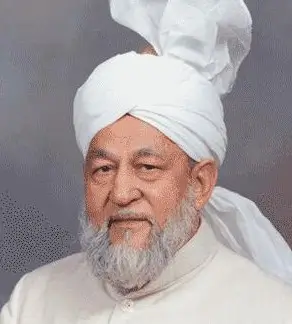The policy is clearly laid down by Hazrat Aqdas Muhammad Mustafa sallallahu alayhi wa sallam. Our mosques are open to anyone who wants to worship God. And we expect other people’s mosques to be open in the same spirit to us. But if our saying our prayers there in congregation hurts them, then we should avoid that. Now, to say prayer behind those who deny Hazrat Masih Maud’s claim to be the reformer of the age, prophet of the age, as sent, raised by Allah himself, you can’t say your prayer behind them.
Because imamat, the imamat in prayer is just a symbol. The true imamat only comes from Allah. Imamat means leadership. So if Allah has revealed a religious leadership, those who have broken contact with that leadership, even they have become hostile to that leadership, how can they remain imam to you? It’s a contradiction in itself. So an Ahmadi can never say his prayer behind a person who denies Hazrat Masih Maud a.s. and calls him an aposter. Because that is, if you do that, you will follow him in that. And behind imam, your own intention simply does not mean anything. Whatever imam intends, you follow.
Suppose in his prayer, he is praying against Masih Maud a.s. and in his prayer, he is wishing ill of the whole community. Because you are following the imam and you have trusted him, you will also be responsible for whatever he is doing. So there are so many factors. Keeping them in view, Hazrat Masih Maud a.s. has forbidden it now categorically. That from now on, as when he has declared that, I mean from then on, no Ahmadi was permitted to say his prayer behind a non-Ahmadi who declares Masih Maud a.s. to be a liar. That is a logical conclusion.
And as far as the rest of the Muslim sects are concerned, they all agree 100% with this attitude. They don’t believe in Hazrat Masih Maud a.s. to be the imam Mahdi. They say, alright, when the imam Mahdi comes, whoever refuses to accept him as imam, no follower of imam Mahdi can say prayer behind him. This is their opinion as well. So on this we do not differ. This is one thing where Ahmadi and non-Ahmadi theology is exactly the same. If that is what you meant by that question, then I have made myself clear.






